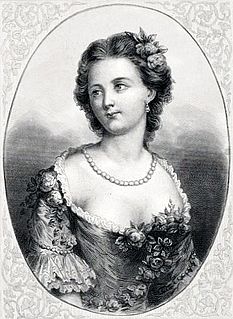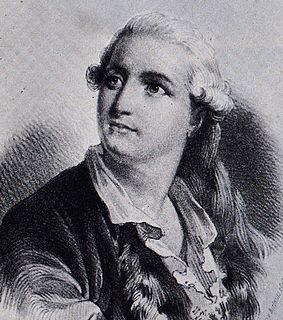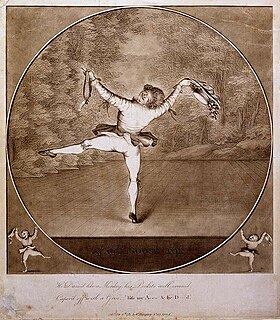 W
WMarie Allard (1742–1802) was a French ballerina. She debuted in the Paris Opera in 1761.
 W
WAnne and Janneton Auretti were French ballerinas who performed for London audiences and French royalty in the mid- to late-18th century. A dance named after them is still performed today.
 W
WClaude Balon was a French dancer and choreographer. The ballet term ballon is sometimes said to be derived from his name, but Robert Greskovic calls this "dubious". Balon danced under the tutelage of the balletmaster Pierre Beauchamp at the Paris Opera. Marie Sallé is identified as a student of Balon's.
 W
WAntoine Bournonville was a French ballet dancer a choreographer, active in the Royal Swedish Ballet and the Royal Danish Ballet and eventually ballet master in the latter. He is considered to have played a great role in the development of the ballet in Scandinavia. He was the father of August Bournonville.
 W
WMarie Anne de Cupis de Camargo, sometimes known simply as La Camargo, was a French dancer. The first woman to execute the entrechat quatre, Camargo was also allegedly responsible for two innovations in ballet as she was one of the first dancers to wear slippers instead of heeled shoes, and, while there is no evidence that she was the first woman to wear the short calf-length ballet skirt, the now standardized ballet tights she did help to popularize these. She is said to have been as strong as the male dancers.
 W
WBabette Cochois (1725–1780) was a French writer and ballerina active in Prussia.
 W
WJean-François Coulon was a French ballet dancer and teacher.
 W
WJean Dauberval, a.k.a. Jean D’Auberval,, was a French dancer and ballet master. He is most noted for creating the ballet, La fille mal gardée, one of the most enduring and popular works of the ballet repertoire.
 W
WAngélique Debargues , was a French ballerina. She is known as the mistress of Augustus II the Strong in the 1710s.
 W
WAndré-Jean-Jacques Deshayes was a French ballet dancer, choreographer and ballet master born in Paris on 24 January 1777 and died in Batignolles on 10 December 1846.
 W
WJean-Étienne Despréaux was a French ballet dancer, choreographer, composer, singer and playwright.
 W
WCharles-Louis Didelot was a French dancer, the creator of the ballet shoes and choreographer. The son of Charles Didelot, the dance master of the King of Sweden, he studied dance with his father, who was an instructor in dance at the Swedish Opera, and debuted as dancer in the theatre of Bollhuset in Stockholm 1786.
 W
WLouis Dupré (1697–1774) was a French ballet dancer, ballet master and ballet teacher.
 W
WMarie Justine Benoîte Favart was an operatic singer, actress, playwright and dancer, the wife of the dramatist, Charles Simon Favart.
 W
WLouis Gallodier was a French ballet dancer and choreographer who spent the majority of his career in Sweden, where he was to have a great importance for the development of the ballet in Sweden as the ballet master of the Royal Swedish Ballet.
 W
WMaximilien Gardel was a French ballet dancer and choreographer of German descent. He was the son of Claude Gardel, ballet master to King Stanisław Leszczyński, and elder brother of Pierre Gardel.
 W
WMarie-Madeleine Guimard was a French ballerina who dominated the Parisian stage during the reign of Louis XVI. For twenty-five years she was the star of the Paris Opera. She made herself even more famous by her love affairs, especially by her long liaison with the Prince of Soubise. According to Edmond de Goncourt, when d'Alembert was asked why dancers like La Guimard made such prodigious fortunes, when singers did not, he responded, "It is a necessary consequence of the laws of motion".
 W
WMarie Louise Marcadet née Baptiste was a Swedish opera singer and a dramatic stage actress of French origin. She was active in the Royal Swedish Opera as a singer, and in the Royal Dramatic Theatre and the French Theater of Gustav III as an actress. She was a member of the Royal Swedish Academy of Music from 1795.
 W
WJean-Baptiste Landé was a French ballet dancer, active in Sweden, Denmark and Russia. He is the founder of the Russian Ballet Mariinsky Ballet.
 W
WCharles Felix Richard Auguste Le Picq was an influential French dancer and choreographer. One of the most outstanding dancers of the eighteenth century.
 W
WLouis-Jacques-Jessé Milon was a French ballet dancer, choreographer, and ballet master.
 W
WJean-Georges Noverre was a French dancer and balletmaster, and is generally considered the creator of ballet d'action, a precursor of the narrative ballets of the 19th century. His birthday is now observed as International Dance Day.
 W
WMademoiselle Parisot was a French opera singer and ballet dancer in the late 18th and early 19th centuries. Her provocative costumes and dances caused an uproar in London and led to the imposition of restrictions on performances.
 W
WLouis Pécour was a French dancer and choreographer. He is most well known for his work with the Académie Royale de Musique.
 W
WFrançoise Prévost was a French ballerina who helped establish dramatic dance in the early world of classical ballet. She was expressive, light and dramatic in style.
 W
WMarie Sallé (1707–1756) was a French dancer and choreographer in the 18th century known for her expressive, dramatic performances rather than a series of "leaps and frolics" typical of ballet of her time.
 W
WMarie-Thérèse Perdou de Subligny (1666–1735) was a French ballerina. She entered the l'Académie Royale de Musique in 1688, where she succeeded Mademoiselle de Lafontaine as prima ballerina, a position she held until 1707. She appeared mostly in opera ballets of Jean-Baptiste Lully and André Campra. She was the first professional ballerina to appear in England (1702-3). She was seen as one of the Queens of ballet.
 W
WMarie-Jean-Augustin Vestris, known as Auguste Vestris, was a French dancer.
 W
WGaetano Apolline Baldassarre Vestris, French ballet dancer, was born in Florence and made his debut at the opera in 1749.